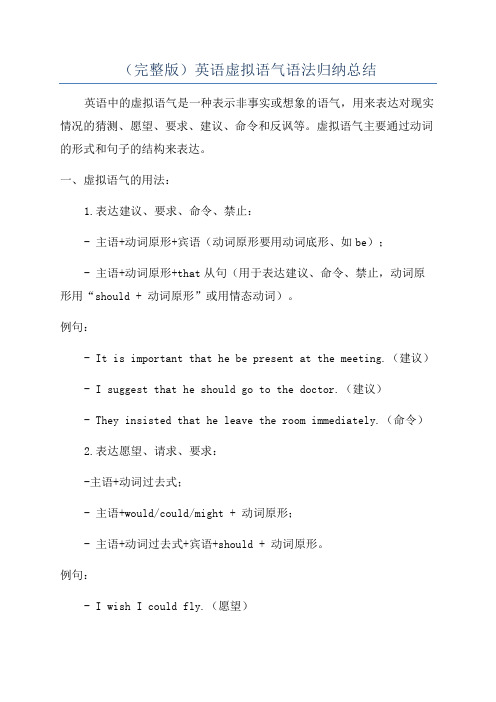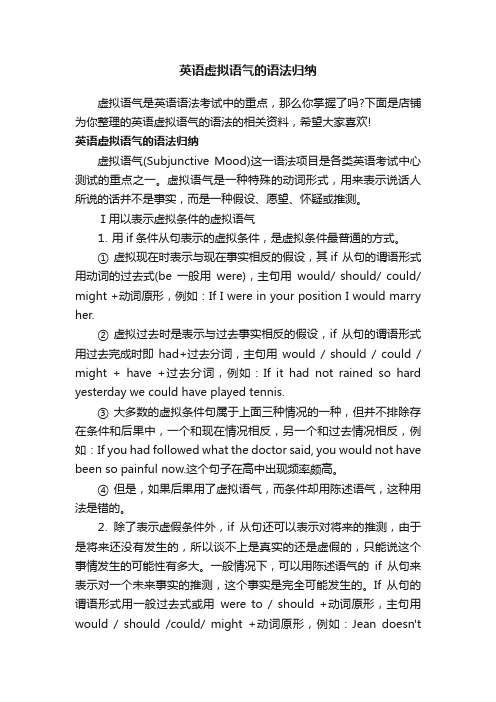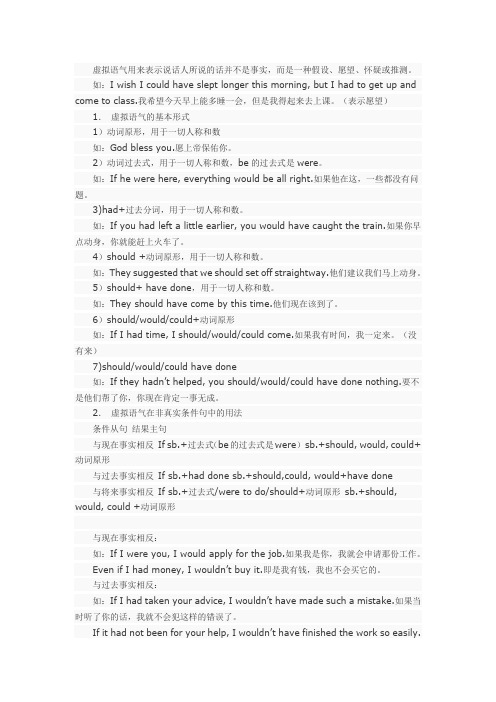宾语从句中的虚拟语气
虚拟语气的八种情况

No.1虚拟语气的常见类型和句型(1)由wish引起的表示愿望的虚拟语气A.用wish表示对现在的愿望时,它所引起的宾语从句中谓语动词形式为:过去式(be动词用were)。
B.用wish表示对将来的愿望时,它所引起的宾语从句中谓语动词形式为:would, could, might+ 动词原形。
C.wish用于对过去的事实表示一种不可能实现的愿望时,宾语从句中的谓语动词形式为:had+动词过去分词或could, would + have +动词过去分词。
The picture exhibition bored me to death; I wish I had not gone to it.---“I let Joe borrow our radio for the afternoon.”---“That’s all right, but I wish he would buy one of his own.”I wish that he weren’t so lazy.(2)had hoped引起的宾语从句中备用语动词形式为would+动词原形,表示一种过去未实现的愿望或令人失望的事。
His father had hoped that his son would go to business with him, but his son became an artist later.(3)would (had) rather, would as soon, would sooner和would prefer所引起的从句中要求用过去式表示当时或将来的情况,用过去完成时表示过去的情况,表示希望或婉转的责备。
例如:I’d rather you posted the letter right away. 我倒希望你把这封信立刻寄出去。
I would prefer he didn’t stay there too long.我倒希望他不要在那儿可得太久。
虚拟语气在从句中的用法

虚拟语气在从句中的用法1.主语从句中的用法(1)在以 it 为形式主语的复合句中,虚拟语气在主语从句中表示建议、要求、命令等,谓语动词用 should be 型或 be 型虚拟式,在美国英语中常用be 型虚拟式。
如:It ’ s natural that she should do so.她这么做是很自然的事。
It is essential that we should tell her the news.我们有必要告诉她这个消息。
It is important that we should make full use of our mineral resources.对我们来说,充分利用我国的矿产资源是重要的。
It is strange that the result of the experiment should be unsatisfactory.奇怪的是实验结果竟然如此令人不满意。
It is desired that we should get everything ready by tonight.希望一切在今晚准备好。
It was arranged that Mr Sam should go and help Bettie.他们作了安排,由萨姆先生去帮助贝蒂。
(2) 主句的谓语为某些动词的被动语态,常用在It is (was) desired (suggested, settled ,proposed, recommended, requested, decided, etc.) that...句型中。
It is suggested that the question should be discussed at the next meeting.有人建议在下次会上讨论这个问题。
It is vital that he should be warned before it is too late.在还不太晚的时候警告他是非常必要的。
(完整版)英语虚拟语气语法归纳总结

(完整版)英语虚拟语气语法归纳总结英语中的虚拟语气是一种表示非事实或想象的语气,用来表达对现实情况的猜测、愿望、要求、建议、命令和反讽等。
虚拟语气主要通过动词的形式和句子的结构来表达。
一、虚拟语气的用法:1.表达建议、要求、命令、禁止:- 主语+动词原形+宾语(动词原形要用动词底形、如be);- 主语+动词原形+that从句(用于表达建议、命令、禁止,动词原形用“should + 动词原形”或用情态动词)。
例句:- It is important that he be present at the meeting.(建议)- I suggest that he should go to the doctor.(建议)- They insisted that he leave the room immediately.(命令)2.表达愿望、请求、要求:-主语+动词过去式;- 主语+would/could/might + 动词原形;- 主语+动词过去式+宾语+should + 动词原形。
例句:- I wish I could fly.(愿望)- I would appreciate it if you could help me.(请求)3.表示虚拟条件:- If条件从句中的谓语动词用过去完成时,主句用would/should/might/could + have + 过去分词;- If条件从句中的谓语动词用过去时,主句用would/should/could + 动词原形。
例句:- If I had known his phone number, I would have called him.(虚拟条件)- If you had listened to me, we could have finished the project earlier.(虚拟条件)4.表达建议、要求、祝愿:- If only内部称述 + 主语 + 过去式。
英语虚拟语气的语法归纳

英语虚拟语气的语法归纳虚拟语气是英语语法考试中的重点,那么你掌握了吗?下面是店铺为你整理的英语虚拟语气的语法的相关资料,希望大家喜欢!英语虚拟语气的语法归纳虚拟语气(Subjunctive Mood)这一语法项目是各类英语考试中心测试的重点之一。
虚拟语气是一种特殊的动词形式,用来表示说话人所说的话并不是事实,而是一种假设、愿望、怀疑或推测。
Ⅰ用以表示虚拟条件的虚拟语气⒈ 用if条件从句表示的虚拟条件,是虚拟条件最普通的方式。
① 虚拟现在时表示与现在事实相反的假设,其if 从句的谓语形式用动词的过去式(be 一般用were),主句用would/ should/ could/ might +动词原形,例如:If I were in your position I would marry her.② 虚拟过去时是表示与过去事实相反的假设,if 从句的谓语形式用过去完成时即had+过去分词,主句用would / should / could / might + have +过去分词,例如:If it had not rained so hard yesterday we could have played tennis.③ 大多数的虚拟条件句属于上面三种情况的一种,但并不排除存在条件和后果中,一个和现在情况相反,另一个和过去情况相反,例如:If you had followed what the doctor said, you would not have been so painful now.这个句子在高中出现频率颇高。
④ 但是,如果后果用了虚拟语气,而条件却用陈述语气,这种用法是错的。
⒉ 除了表示虚假条件外,if从句还可以表示对将来的推测,由于是将来还没有发生的,所以谈不上是真实的还是虚假的,只能说这个事情发生的可能性有多大。
一般情况下,可以用陈述语气的if从句来表示对一个未来事实的推测,这个事实是完全可能发生的。
高考英语语法专题讲解之虚拟语气

She would leave her husband except for children.
如果没有孩子的话,她就会离开她的丈夫的
考题点击:
D much longer time. 1.I went by plane; otherwise I ____ A.could take B.would take C.will have taken D.would have taken
1. If only grandmotherB ____ this together with us now.
A. will see B.could see C.must see D.should see
C quietly as the doctor instructed, 2. If only he ___ he would not suffer so much now. A. lies B. lay C. had lain D. should lie
If only she had lived a little longer. 3. If only he had arrived in time.
比较if only与only if only if 表示“只有”; I wake up only if the alarm clock rings.
[考题]
(2)错综时间虚拟条件句 虚拟条件句与主句谓语动词发生的时间有时不 一致,要注意主从句谓语形式。 [考题] It is hard for me to imagine what I would be doing today if I ___ in love, at the age of seven, with the Melinda Cox Library in my hometown. A. wouldn’t have fallen B. had not fallen C. should fall D. were to fall
虚拟语气用法详解

河高高三英语语法专题讲练——虚拟语气用法一、条件句中的虚拟语气(1)现在时的条件句中的虚拟语气。
如:If he were free, he would help us.。
If he studied at this school, he would know you well.(2)过去时的条件句中的虚拟语气。
如:If I had seen the film, I would have told you about it.If I had got there earlier, I would have met Mr. Li. 假如(3)将来时的条件句中的虚拟语气。
如:If he should go to Qing Hua University, he would make full use of his time.If he were to come here, he would tell us about it.注意:1.当虚拟条件句的谓语动词含有were, should, had 时,if 可省略,而将were, should, had等词置于句首。
如:Should he agree to go there, we would send him there.Were she here, she would agree with us.Had he learnt about computers, we would have hired him to work here.2. 错综时间虚拟语气当条件状语从句表示的行为和主句表示的行为所发生的时间不一致时,被称为“错综时间条件句”,动词的形式要根据它所表示的时间作出相对应的调整。
If I were you, I would have gone to the theatre last night.If you had followed my advice just now, you would be better now.二、宾语从句中的虚拟语气1.表示请求、要求、命令或建议等意义的动词所接的宾语从句一般用虚拟语气,其虚拟语气的结构为:(should) + 原形动词。
Insist后宾语从句何时用虚拟语气

insist后宾语从句何时用虚拟语气请看下面一道题:The man in prison insisted that he _________ nothing wrong and _________ set free.A. had done, should beB. should do, should beC. had done, had beenD. should do, had beend do, had be【分析】此题容易误选B,想当然地认为insist 后的从句谓语要用“should+动词原形”这样的虚拟语气。
事实上,insist后的从句谓语是否用“should+动词原形”这样的虚拟语气,要看该谓语动词所表示的含义。
一般说来,若该谓语动词所表示的动作尚未发生,或尚未成为事实,则用虚拟语气;若该谓语动词所表示的动作已经发生,或已经成为事实,则要用陈述语气。
对上题而言,坐牢的这个人坚持了两点:一是没做错事,二是应该释放。
很显然,在坐牢这个人看来,“没做错事”应该是事实,故用陈述语气;“被释放”还不是事实(因为他还在坐牢),故用虚拟语气。
所以此题的最佳答案应为A。
又如:He insisted that I had read his letter. 他坚持说我看过他的信。
(“看信”已成为事实,故用陈述语气)He insisted that I should read his letter. 他坚持要我看他的信。
(“看信”尚未成为事实,故用虚拟语气)请再做下面一题:The patient insisted that he _________ ill and _________ to the hospital.A. wasn’t, wasn’t sentB. wasn’t, shouldn’t be sentC. shouldn’t be, wasn’t sentD. shouldn’t be, shouldn’t be sent答案选B,因为在说话者看来,“没病”是事实,故用陈述语气;“不送医院”尚未成为现实,故用虚拟语气。
虚拟语气(专升本)

虚拟语气用来表示说话人所说的话并不是事实,而是一种假设、愿望、怀疑或推测。
如:I wish I could have slept longer this morning, but I had to get up and come to class.我希望今天早上能多睡一会,但是我得起来去上课。
(表示愿望)1.虚拟语气的基本形式1)动词原形,用于一切人称和数如:God bless you.愿上帝保佑你。
2)动词过去式,用于一切人称和数,be的过去式是were。
如:If he were here, everything would be all right.如果他在这,一些都没有问题。
3)had+过去分词,用于一切人称和数。
如:If you had left a little earlier, you would have caught the train.如果你早点动身,你就能赶上火车了。
4)should +动词原形,用于一切人称和数。
如:They suggested that we should set off straightway.他们建议我们马上动身。
5)should+ have done,用于一切人称和数。
如:They should have come by this time.他们现在该到了。
6)should/would/could+动词原形如:If I had time, I should/would/could come.如果我有时间,我一定来。
(没有来)7)should/would/could have done如:If they hadn’t helped, you should/would/could have done nothing.要不是他们帮了你,你现在肯定一事无成。
2.虚拟语气在非真实条件句中的用法条件从句结果主句与现在事实相反If sb.+过去式(be的过去式是were)sb.+should, would, could+动词原形与过去事实相反If sb.+had done sb.+should,could, would+have done与将来事实相反If sb.+过去式/were to do/should+动词原形sb.+should, would, could +动词原形与现在事实相反:如:If I were you, I would apply for the job.如果我是你,我就会申请那份工作。
- 1、下载文档前请自行甄别文档内容的完整性,平台不提供额外的编辑、内容补充、找答案等附加服务。
- 2、"仅部分预览"的文档,不可在线预览部分如存在完整性等问题,可反馈申请退款(可完整预览的文档不适用该条件!)。
- 3、如文档侵犯您的权益,请联系客服反馈,我们会尽快为您处理(人工客服工作时间:9:00-18:30)。
三宾语从句中的虚拟语气
1.wish引导的宾语从句中的虚拟语气主要形式为:
●表示对现在的假设时,从句的谓语动词为一般过去式(be动词用were)。
●表示对过去的假设时,从句的谓语动词为“had+过去分词”或“could/would have+过去分词”。
●表示对将来的愿望时,从句的谓语动词用“would/could/might+动词原形”。
Sometimes I wish I lived in a different time and a different place.有时候我希望自己生活在一个不同的时间和空间里。
(表现在)
I wish I were as strong as you.我希望像你一样健壮。
(表现在)
He didn’t go to the party, but he does wish he had been there.他没有去舞会,不过他很希望自己当时在那里。
(表过去)
I wish prices would come down.我希望物价能降下来。
(表将来)
2.had hoped 表示过去没有实现的愿望,意为“本来想要,但愿”,其后的宾语从句用“would+动词原形”表示虚拟。
I had hoped that I wouldn’t bore you by talking about my children. 但愿我谈论我的孩子没有使你厌倦。
3.would rather, would sooner, would just as soon, might as well, would prefer之后的宾语从句用虚拟语气表示愿望,意为“宁愿”,“但愿”。
●表示对现在或将来的愿望:would rather/sooner+主语+动词过去时(be动词用were);
●表示对过去的愿望:would rather/sooner+主语+动词过去完成时。
I would rather I had not gone to the party yesterday evening.要是我昨天晚上没有去参加那个晚会就好了。
(表过去)
I would rather/sooner you came tomorrow.我宁愿你明天来。
(表将来)
4.在表示命令、建议或要求等动词后的宾语从句中要求用虚拟语气,谓语形式为“(should)+动词原形”。
这类动词有:ask(要求),advise(建议),suggest (建议),request(请求;要求),commend(推荐),decide(决定),determine (决定),insist(坚持认为),intend(打算),prefer(更喜欢;宁愿),propose (提议),order(命令),recommend(推荐),imagine(想象)等。
I suggested that you (should)try to understand him.我曾建议你试着去理解他。
They demanded that the aggressor troops (should) be withdrawn immediately.他们要求立即撤出侵略军。
【专四真题】My boss ordered that the legal documents to him before lunch.
A. be sent
B. were sent
C. were to be sent
D. must be sent
译文:我老板下令午饭前必须交给他那些法律文件。
分析:若主句谓语动词为suggest, demand, order, propose, request等表示建议、要求、命令等语气的动词,后面的宾语从句要用虚拟语气,谓语动词用“(should+)动词原形”,因此选A。
四主语从句中的虚拟语气
虚拟语气用于主语从句的常见结构是“It is+形容词/名词/过去分词+that引导的主语从句”,主语从句的谓语动词为“(should)+动词原形”。
适用此结构的词包括:
形容词:advisable(可取的,明智的),appropriate(适当的),desirable(想要的),essential
(必需的),fundamental(基本的),imperative(命令的),important(重要的),necessary
(必要的),proper(适当的),urgent(紧急的,急迫的),vital(至关重要的)等。
名词:a pity(可惜),a shame(耻辱;羞愧),no wonder that(难怪)等。
过去分词:arranged(安排,计划),desired(渴望),requested(请求),suggested(建议),recommended(推荐),required(必需),demanded(要求)等。
It is essential that these application forms(should)be sent as early as possible.重要的是把这些申请表尽早寄出去。
It is highly desirable that a new president(should)be appointed for this college.大家非常希望一位新校长来管理这所大学。
【专四真题】It is imperative that the government more investment into the shipbuilding industry.
A. attracts
B. shall attract
C. attract
D. has to attract
译文:势在必行的是,政府应该在船坞制造业吸引更多的投资。
分析:It is imperative that…表明that从句需要使用虚拟语气,其形式为“should+动词原形”,其中should可以省略,故答案为C。
五表语从句和同位语从句中的虚拟语气
在表示建议、命令、主张、目的、愿望等名词后面的表语从句和同位语从句中的常用虚拟语气,谓语动词的形式为“(should)+动词原形”。
这类名词有:suggestion(建议),proposal(提议,建议),requirement(要求),order (命令),demand(要求),decision(决定),advice(建议),desire(要求),idea(主意),importance(重要性),instruction(指示),necessity(需要;必需),motion(提议),preference (优先考虑),recommendation(推荐;建议),resolution(解决),request(要求)等。
His desire is that he(should)be buried next to his wife.他希望死后与妻子合葬。
The suggestion that the mayor(should)present the prizes was accepted by everyone.每个人都接受了让市长来颁奖的建议。
【专四真题】He left orders that nothing touched until the police arrived here.
A. should be
B. ought to be
C. must be
D. would be
译文:他留下命令说警察到这里之前不得碰任何东西。
分析:orders表明其后同位语从句中的谓语动词要用虚拟语气,形式为“(should+)动词原形”,故选项A正确。
